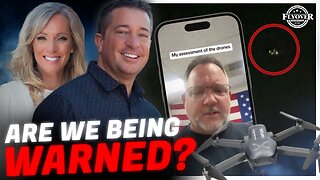Premium Only Content

UPDATE ON KK'S HEALTH- #3
ARTICLE ON USING KETALORAC (TORADOL) PER- OPERATIVE FOR BREAST CANCER SURGERY
The back story to the one dollar pill: (From the Moss Report)
About ten years ago, an anesthesiologist named Patrice Forget, MD, PhD (pronounced “For-shay”), of University Hospital, Brussels, compared the cancer recurrence rate of 327 women. All the women had received one of four different painkillers during their surgery for breast cancer. Dr. Forget found something astonishing. There was a greatly reduced risk of a distant relapse among breast cancer patients who got ketorolac. This was compared to patients who received the three other non-NSAID painkillers. They got no such benefit.
There was a good scientific reason why this would be so. As the name implies, an NSAID is an anti-inflammatory drug, not specifically a breast cancer pill. And as Dr. Forget has said:
“Surgery and inflammation are closely associated, and linked to mechanisms that promote tumor growth.”
Here’s how they are “closely associated.” When a surgeon removes a tumor, the resulting surgical wound causes systemic inflammation for a week or so. The body, in trying to heal that wound, release some hormone-like compounds to speed healing. But these growth and repair signals can have an unanticipated side effect. If the patients have any remaining cancer cells in their bodies, the normal wound healing can stimulate the re-growth of their cancers.
How does it work?
Single cancer cells can start dividing. Also, tiny colonies of cancer cells, called micrometastases, can begin to create a network of blood vessels. This new blood supply can bring nutrients to the cancer and remove its waste products. Once this process gets underway, a new tumor can form very quickly.
A tiny dot of cancer can turn into a menacing new growth as early as a year or two years after surgery. Scientists call this the “first peak” of cancer relapse. In many clinical trials, it has been found that the risk of metastasis is highest during the second year after the primary diagnosis. Then comes a period of calm, followed by a “second peak” at about 5 to 6 years. Ketorolac seems to dramatically reduce that “first peak” of cancer.
One of Dr. Forget’s most provocative findings was that only a few days, or even a single injection, of ketorolac after surgery changes the odds of a relapse of breast cancer.
Patients who got ketorolac at the time of surgery had about 80% fewer early recurrences compared to those who got the non-NSAID drug!
It is unheard of to get such an enormous benefit from such a simple intervention.
Is it proven to work?
The case for ketorolac right now rests on two retrospective studies. The first was the Belgian study of Dr. Forget that started this whole line of thought. The second was a 2018 study, also carried out in Belgium, which was reported in the Journal of the National Cancer Institute (JNCI). It showed that there was a 41% reduction in the risk of distant recurrences. But there was an even larger benefit of 45% in women who were overweight or obese. These two studies show “a definite benefit of perioperative ketorolac in breast cancer,” according to Dr. Michael Retsky of the Harvard School of Public Health.
A prospective clinical trial from the Anticancer Fund of Belgium was presented as a poster at the December 2018 San Antonio breast cancer meeting. Patients were given a single dose of 30 mg of ketorolac before surgery. Both arms of the study had about the same rate of distant recurrences at 9 and 18 months. This poster presentation has not yet been published as a journal article, but will be soon. So it will obviously take further clinicals trial to get these issues sorted out.
Meanwhile, Dr. Retsky says that if his wife ever had breast cancer, he would definitely urge her to get ketorolac at the time of surgery.
Why not?
Since each ketorolac pill costs less than a dollar, and the potential harm from a few days of treatment is relatively small (given the potential benefit), why isn’t every woman going in for breast cancer surgery at least made aware of these facts? At best, it might dramatically decrease the chance of having to deal with metastatic cancer a year or two after surgery.
-
 1:18:00
1:18:00
FREE THE PODCAST
1 year agoEPISODE 83- HOW CLOSE ARE WE TO THE END OF THE WORLD AS WE KNOW IT?
2.21K8 -
 59:57
59:57
The Tom Renz Show
17 hours ago"Health and Health freedom - next steps"
7.78K3 -
 39:40
39:40
PMG
14 hours ago $7.15 earned"Paulo Figueiredo, Mehek Cooke, Ashley Hayek, Mark Mitchell- The Breanna Morello Show"
35.2K4 -
 3:37:41
3:37:41
Fresh and Fit
7 hours agoGirls React To Lily Philips Sleeping With 100 Guys
125K52 -
 27:00
27:00
Stephen Gardner
9 hours ago🔥McConnell ATTACKS Trump | HUGE Update on MILITARY DRONES mission!!
109K147 -
 8:10:03
8:10:03
Dr Disrespect
18 hours ago🔴LIVE - DR DISRESPECT - WARZONE - HUNTING SEASON
259K77 -
 1:32:28
1:32:28
Fresh and Fit
11 hours agoHow To Wholesale and Fix & Flip Real Estate!
71.5K11 -
 1:30:55
1:30:55
Flyover Conservatives
1 day agoDrones, Darkness, and Divine Intervention: Unpacking Prophecy and Reality - Dr. Troy Spurrill | FOC Show
44.3K2 -
 59:32
59:32
The StoneZONE with Roger Stone
9 hours agoHonoring Great American Patriots for Helping to Save our Country | The StoneZONE w/ Roger Stone
95.4K8 -
 1:09:50
1:09:50
Donald Trump Jr.
14 hours agoHow Sean Parnell Helped Deliver PA, Plus Why Pete Hegseth Must Be Confirmed | TRIGGERED Ep.199
218K93